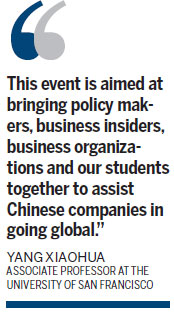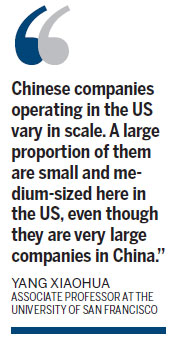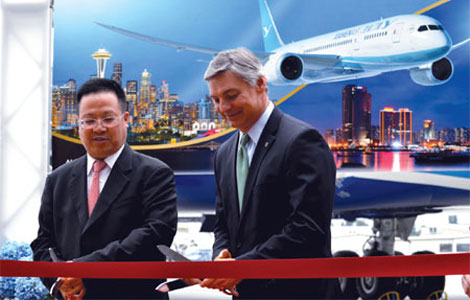Firms hear success tips in the US
Updated: 2014-09-01 10:53
By Lian Zi in San Francisco(China Daily USA)
|
||||||||
Human capital is the key to success for Chinese companies doing business in the US, a panel discussion suggested.
China's General Chamber of Commerce-USA and the China Business Studies Initiative of the University of San Francisco held a panel discussion on the release of a new survey report Chinese Enterprises in US at the University of San Francisco on Aug 29.
Representatives of local Chinese enterprises, business schools, law firms and overseas organizations joined in the discussion. The survey was conducted by Yang Xiaohua, associate professor at the University of San Francisco, and Richard Huang, executive director of China General Chamber of Commerce-USA.
Other panelists included Ben Chen, a representative of China Unicom; Jeff Leader, a governmental affairs consultant; and Marshall Meyer, a professor from Wharton School of Business.

"This event is aimed at bringing policy makers, business insiders, business organizations and our students together to assist Chinese companies in going global," said Yang.
The report talked about the business environment for Chinese companies investing in the US. It also emphasizes that these companies need to be guided by local talents and experts and integrated into the local community, Huang said.
According to Yang, Chinese outbound investment in the US is growing tremendously and this trend is unstoppable. "Last year, Chinese firms invested more than $14 billion in the US, which was doubled from the year before," said Yang, adding that China's outbound FDI is expected to exceed inbound FDI for the first time in 2014.
However, some Chinese enterprises operating in the US are not doing that well and they have to learn how to expand their business in a totally different business environment. Although more than 60 percent of Chinese companies in the US generate revenue, there are still more than 30 percent of them that operate at a loss, Yang said, adding that the high cost of doing business in the US was one of the reasons for their failure.
Yang strongly suggested Chinese companies invest in the US by hiring local talents and training their executives in US business schools to make their business more localized. "Human capital is the key for Chinese companies here in US to gain huge success," she stressed.
"Improving cultural intelligence is also very important," said Yang, who defined cultural intelligence as knowing how to do business in a different environment, where the cultural, legal and political systems are totally different.

Huang gave an example of the differences. "Chinese businessmen prefer to make friends first and then do business," she explained. "But in the US, businessmen prefer to do business first and then make friends with you."
"Chinese companies operating in the US vary in scale. A large proportion of them are small and medium-sized here in the US, even though they are very large companies in China," said Yang, explaining that they are testing the waters and some of them believe that they can be regarded as global companies only if they have operations in US.
In the 1990s, the Business School of the University of San Francisco played an important role in providing MBA and executive MBA programs that educated China's future business leaders, said Stanley Kwong, a professor at the University of San Francisco, adding that it is still a big player in providing education to hundreds of Chinese students.
Founded in 2005, China General Chamber of Commerce-USA (CGCC) is the largest nonprofit organization representing Chinese enterprises in the US. Their mission is to promote Chinese investment in the US, support the legal rights and interests of members, and enhance cooperation between the Chinese and US business communities. CGCC has six regional chapters across the US, located in Chicago, Houston, Los Angeles, New York City, San Francisco and Washington.
zilian@chinadailyusa.com
(China Daily USA 09/01/2014 page1)

 World's largest duty-free shop opens in China's Sanya
World's largest duty-free shop opens in China's Sanya
 Xiamen Air gets its first Dreamliner
Xiamen Air gets its first Dreamliner
 Running track built on school roof
Running track built on school roof
 Expressions on the first day of new school
Expressions on the first day of new school
 Tomatina joy in Northeast China
Tomatina joy in Northeast China
 Peace Mission - 2014 military drill ends in China's Inner Mongolia
Peace Mission - 2014 military drill ends in China's Inner Mongolia
 First steps on a journey of discovery
First steps on a journey of discovery
 Garbage dump turns water into poison
Garbage dump turns water into poison
Most Viewed
Editor's Picks

|

|

|

|

|

|
Today's Top News
Beijing spruces itself up for APEC summit
New Budget Law to change the game
Microsoft asked to explain monopoly accusations
China makes largest share of foreign students
Chinese American to run NYC public schools' fund
US launches fresh air strikes on IS rebels
NPC decision a landmark in HK democratic development
Chui Sai On elected Macao chief executive-designate
US Weekly

|

|







